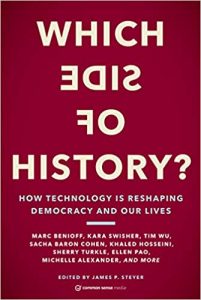
Which Side of History? How Technology is Reshaping Democracy and Our Lives
Edited by James P. Steyer
Chronicle Prism, 2020 ∙ 309 pages
Which Side of History is a collection of short works contributed by 48 authors and very thoughtfully curated by the editor into six categories that define our relationship with technology. From diverse and interesting perspectives, many of the pieces are under five pages in length and are original works although several, like Aaron Sorkin’s trenchant “A Letter to Mark Zuckerberg”, were previously published.
The writers explore the themes of history, the effects of technology on children, democracy, and race, and the errors and hope that technology has delivered to the world. There is a refreshing balance in this collection between hope and alarm, both being equally important to understand our dependence on technology and the power that it holds in all of our lives.
Harvard Professor Shoshanna Zuboff, celebrated author of The Age of Surveillance Capitalism, delivers a brilliant and powerful indictment of big technology in her essay “The Known Unknown”. U.S. Senator Mark Warner provides an unusually frank assessment of the hidden but very real world of state-sponsored cyber threats and their continuing challenges to international peace. But while acknowledging the realities of the problems, hope is evident in the essay that Tristan Harris contributed to the volume and in his founding of the Center for Humane Technology that aims to maintain technology within human control.
I found Khaled Hosseini’s piece, “Technology for Global Good”, to be particularly hopeful. Born in war-torn Afghanistan, a nation populated by a high proportion of youth, Hosseini has served as the goodwill ambassador for the United Nations High Commissioner for Refugees. Hosseini’s essay describes how technology is lifting particularly the youth and women of Afghanistan out of the ravages of war as the country rapidly urbanizes. Hosseini concludes, “The only thing technology enables is human behavior. It amplifies both the good and the bad. Whether we are talking about democracy or humanitarian matters, technology itself changes nothing. We have, after all, the technological means to feed every human soul on the planet. Yet people are starving in Yemen, in South Sudan, in Nigeria, in Somalia. Technology, as the cliché goes, is neither good nor bad. It is instead like a boat. To be a force for greater good, it needs the wind of the right story blowing in its sails. Because, ultimately, it is those stories we tell ourselves, not our technologies, that free or oppress people, that erect or ruin economies, that preserve or hinder democracies.”
Hosseini’s is a truly powerful observation of our relationship with technology, and one that would be difficult to refute. It confirms what we all know, when we stop to reflect, that the algorithms driving our technology are written by humans for purposes that humans determine. It confirms that if we want to avoid destruction with the power of our technological tools, the solution is as simple as telling ourselves a different story in putting the tools to productive use. Why should we be locked in conflicts of the past, when the future awaits with infinite potential? Hosseini’s hopeful conclusion is one that is ultimately within our grasp.

